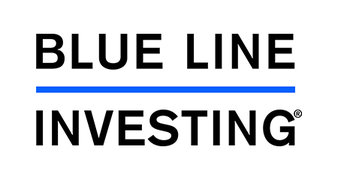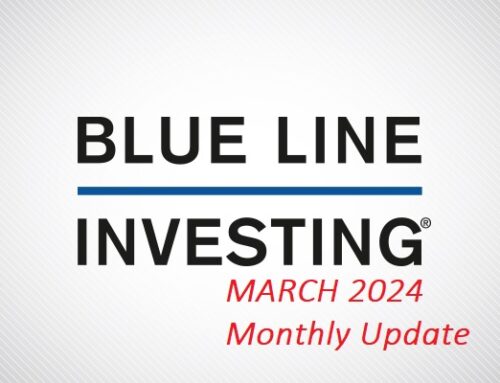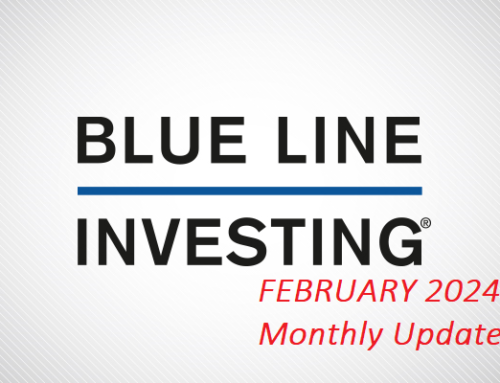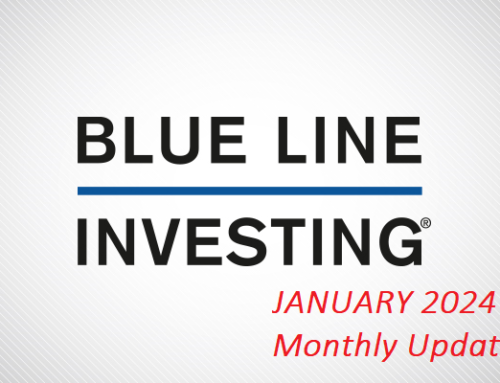 Blue Line Investing, Article 9 of 12
Blue Line Investing, Article 9 of 12
In our previous article we explored two different investment strategies. The first is based on remaining fully invested at all times and substituting investments within your investment portfolio. The second is based on being willing to keep portions of your portfolio in cash by making strategic sell decisions. Our experience has found the second strategy tends to be difficult for many investors to embrace. The usual reason is because they worry they will miss out on the upside by not remaining fully invested. And while this may be true part of the time, by remaining fully invested they are likely to capture all the downside when it occurs.
The late Richard Russell, author of Dow Theory Letters, always emphasized an important investment concept. He stressed that when bear markets occur, they tend to retrace one-third to two-thirds of the preceding stock market advance. In other words, without a sell discipline, your investments that can take years to accumulate, can be significantly impaired or lost within a matter of weeks or months. Consider 2008 as a case in point. Almost the entire price decline occurred from September 2008 through March 2009 – a mere six months. And in that time the entire stock market advance of the previous 5 years (2003 – 2007) was wiped out. What could have helped many investors was the use of a sell discipline. By using and relying on a sell discipline, your focus remains on your process, rather than your emotions. Process can help minimize your emotions and personal biases when making investment decisions. In addition to helping you with a sell decision, your process can also guide you with your purchase decisions as well.
CNBC recently published a portion of an interview on October 12, 2016 with Jim Cramer, the famed trader and the TV host of “Mad Money.” His comments echoed our philosophy and process relating to the benefit and use of a sell discipline. He says it better than we can so we are reposting an excerpt from the article below.
The biggest mistake Jim Cramer sees investors make is that many think they are supposed to be fully invested at all times. Heck, even some money managers have told him that they are supposed to have all their money in stocks. This is complete nonsense! Having cash on hand when a market correction occurs is the key to protecting a portfolio. Sometimes the market will stink, and there is nothing to do but just sit in cash. “In fact, one of the chief reasons that I outperformed pretty much every manager in the business during my 14-year run as a professional money manager is that there were substantial blocks of time when I was largely in cash,” the ” Mad Money ” host said.
We believe it is important for all investors to keep in mind that cash is an asset class, and the rules of investing don’t only say “buy and hold.” To outperform over the long run, we believe it is important to have a sell discipline as part of your investment process. To learn about ours, please review Our Process by visiting www.BlueLineInvesting.com/about-us/.
Disclaimer:
Material presented has been derived from sources considered to be reliable, but the accuracy and completeness cannot be guaranteed. Past performance is not indicative of future results. This material is intended for educational purposes only and is not financial advice or an offer to buy or sell any product. The investment strategy discussed may not be suitable for all investors. Investors must make their own decisions based on their specific investment objectives and financial circumstances. The opinions expressed are those of Blue Line Investing and are not necessarily those of Gordon Asset Management, LLC and are subject to change without notice. Blue Line Investing reserves the right to modify its current investment strategies based on changing market dynamics or client needs. Advisory services offered through Gordon Asset Management, LLC (GAM). GAM is an SEC-registered investment adviser. Registration does not imply a certain level or skill or training. More information about the advisor, its investment strategies and objectives, is included in the firm’s Form ADV Part 2, which can be obtained, at no charge, by calling (866) 216-1920. The principle office of Gordon Asset Management, LLC is located at 1007 Slater Road, Suite 200, Durham, North Carolina, 27703.
Sources:
Richard Russell, Dow Theory Letters, www.DowTheoryLetters.com
Stevenson, Abigal. “Cramer Reveals the No. 1 Reason He Outperformed the Market as a Money Manager.” Yahoo Finance. CNBC, 12 Oct. 2016. Web. 27 Oct. 2016




